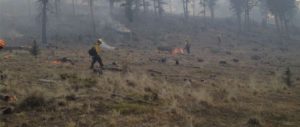
Rocky Mountain Elk Foundation is awarded nearly $300,000 in grant money. The funds will be used for projects over 28 Colorado counties. They will focus on habitat enhancement, research, and hunting heritage outreach projects.
Nearly $300,000 in Rocky Mountain Elk Foundation grants fund more than two dozen habitat enhancement, research and hunting heritage outreach projects in 28 Colorado counties.
The grants, awarded in 2014, total $296,543 and directly benefited Adams, Archuleta, Chaffee, Delta, Denver, Dolores, Eagle, El Paso, Garfield, Grand, Grant, Gunnison, Hindsdale, La Plata, Larimer, Las Animas, Mesa, Moffat, Montrose, Morgan, Park, Pitkin, Rio Blanco, Routt, Saguache, Summit and Teller Counties. There was also one project of statewide interest.
“Colorado has some of the best elk hunting and elk habitat in the United States,” said David Allen, RMEF president and CEO. “These thinning, prescribed burning, seeding, noxious weed treatments and other projects will only improve Colorado as a home of superb elk country.”
In addition, Allen thanked Colorado’s RMEF volunteers who conducted fundraising projects at their banquets, through membership drives and other events to generate the funding. He also thanked volunteers and members around the nation for their dedication to conservation.
RMEF grants fund the following 2014 projects, listed by county:
Adams County—Provide Torstenson Family Endowment (TFE) funding to expand the range of shooting skill clinics with the purchase of four trap throwers and an eight-trap wireless controller for the Colorado Parks and Wildlife (CPW) Novice Hunter Program where new hunters learn about hunting strategies, laws, regulations and how to safely handle shotguns in the field. The equipment will be located at CPW’s Barr Lake State Park in Brighton and Jackson Lake State Park in Orchard (also affects Morgan County); and co-sponsor the Colorado Wildlife Employees Protective Association sporting clays fundraiser to benefit the college funds for the three children of CPW Officer Jon Wangnild who passed away in 2013.
Chaffee County—Broadcast burn more than 4,000 acres at varying intensities to stimulate mountain mahogany sprouting and reduce pinyon-juniper invasion into grassland, dead and down fuels and duff layer on the San Isabel National Forest.
Denver County—Co-sponsor the Colorado Conservation Reception at the 79th Annual North American Wildlife and Natural Resources Conference in Denver; and RMEF volunteers host its Shooting Access for Everyone (SAFE) shooting inflatable at the Bass Pro Fall Hunting Clinic.
Dolores County—Burn 284 acres to increase grass and forb production and reduce fuels on high use elk and deer winter range as part a larger-scale effort to treat 25,000 acres of Bureau of Land Management (BLM) lands in the Dolores River Canyon.
Eagle County—Thin 605 acres of pinyon-juniper encroachment into sagebrush habitat on BLM lands above the Colorado River near Burns to benefit multiple species particularly elk, mule deer and sage-grouse.
El Paso County—RMEF volunteers host the SAFE shooting inflatable at Muley Days which provided educational and hands-on instruction in wildlife, outdoor and conservation education; and RMEF volunteers host the SAFE shooting inflatable at the Bass Pro Fall Hunting Clinic.
Garfield County—Install more than 8,000 feet of buried pipeline in the Garfield State Wildlife Area to provide irrigation water to six forage plots totaling nine acres on elk and deer crucial winter range in an effort to draw animals away from private agricultural lands.
Grand County—Provide funding for a Colorado Department of Transportation project to deploy motion-triggered cameras to help locate two future wildlife overpasses and five wildlife underpasses to help reduce vehicle-wildlife collisions on a 10.6-mile stretch of Highway 9 between Green Mountain Reservoir and the Colorado River near Kremmling where more than 450 wildlife documented mortalities took place in the winter months since 2005 (also affects Summit County); and provide funding for noxious weed treatments on 382 acres on the Arapaho-Roosevelt National Forest including the Beaver Park, Big Meadows, Cub Creek, Cole Creek Ponds, Cottonwood Pass, Cub Creek, Doe Creek Trail, Eightmile Creek, Horseshoe Trail, Morgan Gulch, Strawberry Bench Trail and Ute Pasture areas. The district has contracted backcountry weed treatments with RMEF since 2002.
Gunnison County—Conduct aggressive treatment of newly established cheatgrass via ATV and pack mule application on 555 acres of crucial winter range on the Almont Triangle and Flat Top area of the Gunnison National Forest, some of the most important winter range for elk in the Gunnison Basin; and install 25 GPS radio collars on elk on the Gunnison National Forest and BLM lands to determine habitat use, movement patterns to get better information so that decision makers can assess and respond to conflict “hot spots” as the Gunnison Basin continues to be impacted by development, grazing, hunting and changes in habitat over time (also affects Hinsdale and Saguache Counties).
LaPlata County—Apply noxious weed treatment with herbicide to 65 acres and 60 acres with biological control in Bonnell Canyon on the San Juan National Forest, an elk winter concentration and transition area 10 miles northeast of Bayfield (also affects Archuleta County).
Larimer County—Remove dead and dying mountain pine beetle-killed lodgepole pine on 50-100 acres in the Cherokee State Wildlife Area to promote aspen regeneration and forage understory growth within elk winter range and winter concentration areas.
Las Animas County—Remove conifers on 240 acres of oakbrush and mixed conifer forests to open canopy and improve forage production on the Bosque del Oso and Spanish Peaks State Wildlife Areas.
Mesa County— Mechanically treat 500 acres of pinyon-juniper and mountain shrub communities on the northwestern end of the Uncompahgre Plateau on the Uncompahgre National Forest in elk summer and winter concentration range (elk densities are 200% greater than the surrounding winter range) in the final phase of a three-year project that previously treated 296 acres; improve 520 acres of elk year-long and high concentration winter range on public lands south of Grand Junction with weed treatment, riparian restoration, and reseeding (also affects Delta and Montrose Counties); burn 1,000 acres across three adjacent burn units to create a mosaic of underburned and burned areas and further enhance forage in previously mechanically treated oak and mountain brush habitat as well as isolated aspen stands on the Uncompahgre Plateau of the Uncompahgre National Forest to benefit elk winter, summer and transition range, mule deer summer and transition range and winter range for Merriam’s turkey; RMEF volunteers host the SAFE shooting inflatable at Outdoor Heritage Day which provided educational and hands-on instruction in wildlife, outdoor and conservation education to youth ages 16 and under; and RMEF volunteers host the SAFE shooting inflatable at the 30th Annual Kite Day in Grand Junction.
Park County—Provide funding to purchase seed mix for application to 14 acres receiving brush hog treatment to remove decadent grass and potentilla along the Middle Fork of the South Platte River in the Tomahawk State Wildlife Area to increase forage for wintering elk; thin 60 acres of conifer encroachment in the James Mark Jones State Wildlife Area within declining aspen stands to stimulate suckering, reduce wildfire potential and to entice elk to stay and/or return to managed public lands; and improve 500 acres of riparian habitat on the Pike National Forest with a variety of techniques including weed treatment and seeding, water development outside the riparian zone, gully contouring, and felling of beetle-killed trees to create check dams to reduce erosion and make the area more difficult to access during recovery.
Pitkin County—Improve water delivery for irrigation system providing wildlife forage on the Basalt State Wildlife Area which is dedicated to winter wildlife including elk, deer and bighorn sheep.
Rio Blanco County—Treat 350 acres of residual and new noxious weed infestations within the Flat Tops Wilderness, Pagoda Roadless Area and in the Morrison Creek drainage including the Bushy Creek Roadless Area on the Medicine Bow-Routt National Forest as part of an ongoing effort to maintain high quality browse on elk summer, winter and calving range (also affects Routt, Grand and Garfield Counties); and provide funding to update monitoring technology, replacing existing sample set of VHS collars with satellite/GPS collars and adding more collars with a project goal to evaluate big game use and distribution relative to habitat enhancement activities to help develop long-term priorities for landscape scale habitat management actions for the Bears Ears and White River elk herds (also affects Moffat and Routt Counties).
Routt County—Improve the Mad Creek elk winter range by treating 50 acres of weed infestations with backpack and ATV sprayers as part of a ten-year effort on the Medicine Bow-Routt National Forest.
Saguache County—Rip and seed ten road miles and place barriers to provide habitat security on the Gunnison National Forest, keep big game on public land and prevent early movement to private land and improve hunting and wildlife viewing opportunities in an area comprised of calving grounds for elk and moose, and fawning areas for deer and pronghorn.
Teller County—RMEF volunteers host the SAFE shooting inflatable at CPW’s annual family Outdoor Skills Day sponsored which provided instruction regarding shooting, archery, fishing, mountain biking, geocaching and living and playing in bear country.
Statewide—Sponsor Country Jam USA Military Day in Grand Junction in June of 2014.
Conservation projects are selected for grants using science-based criteria and a committee of RMEF volunteers and staff along with representatives from partnering agencies and universities. RMEF volunteers and staff select hunting heritage projects to receive funding.
Since 1985, RMEF and its partners have completed 637 different conservation and hunting heritage outreach projects in Colorado with a combined value of more than $154.1 million.
Partners for the Colorado projects include Colorado Parks and Wildlife, Bureau of Land Management, and the Arapaho-Roosevelt, Grand Mesa, Gunnison, Medicine Bow-Routt, Pike, San Isabel, San Juan and Uncompahgre National Forests as well as local businesses, universities and various sportsmen, wildlife, civic and government organizations.
RMEF uses TFE funding solely to further its core mission programs of permanent land protection, habitat stewardship, elk restoration and hunting heritage.
About the Rocky Mountain Elk Foundation:
Founded over 30 years ago, fueled by hunters and a membership of more than 205,000 strong, RMEF has conserved more than 6.6 million acres for elk and other wildlife. RMEF also works to open and improve public access, fund and advocate for science-based resource management, and ensure the future of America’s hunting heritage. Discover why “Hunting Is Conservation™” at www.rmef.org or 800-CALL ELK.


